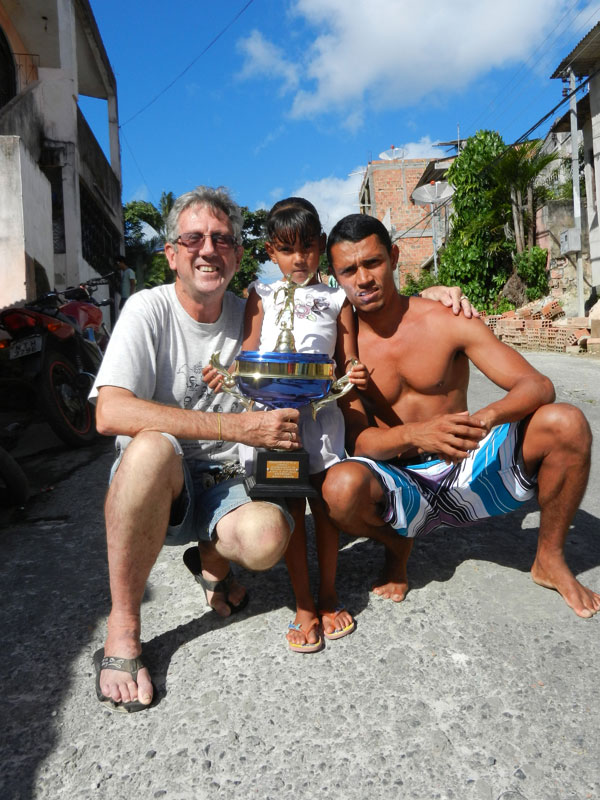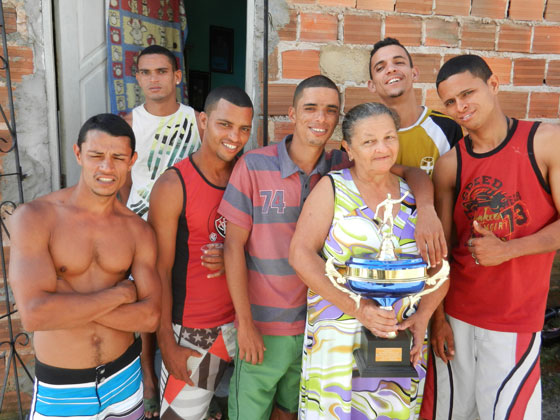Home
By Fr Colin McLean
 Experiences and people who allow me to say: ‘I feel at home in the city of Salvador, in Brazil, where I have lived for the past 26 years’.
Experiences and people who allow me to say: ‘I feel at home in the city of Salvador, in Brazil, where I have lived for the past 26 years’.
In the coffee table book Salvador, an alluring photographic study of life of this city, the Brazilian poet, Jorge Amado, writes:
The city is prey to the spirit of adventurers from all parts of the world, who over the years have exploited her black and heavy beauty, thick as oil and deep as mystery, trying to reduce it to the value so the tourist trade. And everything is small and sad when touched by such hands. There is a persistent and criminal effort to shrink Bahia’s beauty, her dramatic ancient beauty, to the limited scope of a tourist’s curious gaze. Bad poets come from afar to sing her praises in uncomprehending verse, while movie-makers film her without feeling, and millionaires and socialites buy her without knowing her, but she has held out against them all, living on for those who understand and love her. She lives on in her grandeur, her ocean and streets, in the daily renewal of mystery and beauty.
I may be a long way from an adequate appreciation of the lure and mystery of this city and yet I hope the following paragraphs will help the reader appreciate why I am able to feel at home here.
I came here with the first group of Columbans sent to establish a mission in Brazil and have put a lot of emotional effort into staying here, especially during the first three years. Prior to coming to Brazil I had been in the Philippines where I had felt welcomed and affirmed. Here, on the other hand, especially among the Afro-Brazilians, with whom I live and work, the onus is on the outsider to demonstrate who he or she is and whether they are friendly and approachable. The outsider will not be accepted simply because of his or her position (especially as priest or religious sister), as was the case in the Philippines. No doubt in Brazil this is part of the heritage of hundreds of years of slavery when bishops, priests and religious congregations owned slaves. Also, I had been reasonably proficient in the Tagalog language in the Philippines but, aged 40 years on arrival in Brazil, I struggled to learn Portuguese. Brazilians tend to switch off if the foreigner does not speak reasonable Portuguese.
 What kept me here during those difficult first years was the experience of the Columban group. At that time, there were eleven Columbans in Brazil and we met twice a year, each time for four to five days, for personal sharing and to make decisions together. Later, priest associates and lay missionaries from the Philippines and Ireland were fully included in these biannual meetings. This was a new way of operating for Columbans on mission. The decisions were no longer left in the hands of a director with his council but rather all members of the mission participated, tried to work towards a consensus but, if necessary, put the matter under discussion to an open vote. We did not use secret ballots for anything, not even in choosing our mission unit coordinators. However, at times, in order to fulfil the letter of the law we did go through the motions of a secret ballot, which never altered what we had already agreed upon openly.
What kept me here during those difficult first years was the experience of the Columban group. At that time, there were eleven Columbans in Brazil and we met twice a year, each time for four to five days, for personal sharing and to make decisions together. Later, priest associates and lay missionaries from the Philippines and Ireland were fully included in these biannual meetings. This was a new way of operating for Columbans on mission. The decisions were no longer left in the hands of a director with his council but rather all members of the mission participated, tried to work towards a consensus but, if necessary, put the matter under discussion to an open vote. We did not use secret ballots for anything, not even in choosing our mission unit coordinators. However, at times, in order to fulfil the letter of the law we did go through the motions of a secret ballot, which never altered what we had already agreed upon openly.
In 1988, the centenary of the official abolition of slavery in Brazil, the Catholic Bishops’ Lenten Action Program, titled I have heard the cry of my people, focused on the situation of the descendants of African slaves. It invited the Catholics of Brazil to look at the history, culture, social situation of and racial discrimination against black Brazilians who constitute about 45 percent of Brazil’s population and 85 percent of the city of Salvador. It was a powerful moment for many Brazilians and especially for me, as we felt urged and challenged to enter into solidarity with black Brazilians in their struggle for social equality and justice.
In 1990 a Brazilian priest invited me to live in a poor community within his parish. There people got to know me as a neighbour and a friend. They would drop in constantly for a chat. Meeting others as a resident who shared their neighbourhood and not as a priest with a formal role in the parish church was similar to an experience I had lived in the Philippines. Fr Tommy O’Reilly (a diocesan associate from Ireland who worked with us for six years) joined me later and we got on really well.
In 1993 I was invited to attend the National Conference of Black Priests, Bishops and Deacons. The community where I was living and working was 99 percent Black so I was known to be in solidarity with the Black apostolate. At the close of the conference a bishop was ordaining a Black deacon and he called on the Black priests present to join him in the final blessing. I hesitated because he had said ‘Black priests’. The priest beside pointed to the black skin on his arm and said, ‘It is not about this; it’s about the way your heart is. You share our cause, so come on, join us’. I have not looked back since.

Six Lima Rocha brothers with their mother
I do not restrict myself to serving the pastoral needs of our church-going parishioners. I feel very much alive when I am with young people who, for the most part, have little or no contact with the Church. This happens with my friends in theatre, Afro-dance, circus arts and the newly formed parish soccer team. For me, this is missionary outreach as I move out of the church to where these young people feel at home; I join them in their space. Last year our soccer team won the inaugural championship in the deanery league and this year we expect to have ten teams competing. Six of the parishes are run by Brazilian priests and some young priests want to play in their parish teams. For the young players it is not just another morning of sport, but rather it seems to me to be part of the Brazilian passion. In Brazil, soccer competes with soap operas for the attention of millions of TV viewers.
Candomblé is a religion that has its roots primarily in the beliefs of the Yoruba tribe, who have lived for centuries in what today is Nigeria and Benin. This tribe has traditionally recognised a supreme deity who has created mediating spirits (Orixás), who influence forces of nature and human life. By appropriating the Catholic devotion to the saints and angels, brought to Brazil by the Portuguese colonists, Candomblé devotees have maintained their faith in the Orixás. After getting to know something of the religion and befriending Candomblé devotees, I now feel accepted by them and welcome to attend their religious ceremonies. This is a major acceptance on their part, considering that many in the Catholic Church consider Candomblé to be, at best, superstition and, at worst, devil worship.
I enjoy sharing in depth discussions with my fellow priests, religious sisters and laity on pastoral and theological issues at our deanery meetings. In the parish I have similar opportunities with our three deacons and their wives and a group of four religious sisters, three Brazilians and one Spaniard, with whom I share the parish apostolate and missionary work. I also meet regularly with six members, four men and two women, from one of the black movements in the city. We may go to a restaurant or one of our houses where we informally discuss the issues, challenges and strategies that are presently on the agenda of Black movements in Brazil. All are Black and have had a cultural association with the Catholic Church.
Over the years, such a variety of friends from various walks of life and diverse perspectives have welcomed me, have shared with me, have let me be part of their lives and struggles. I really have no excuse for not feeling at home.
The author is from Australia, where he was ordained in 1969. He worked in Our Lady of Remedies Parish, Malate, Manila, before going to Brazil. You may email him at columbans@uol.com.br
